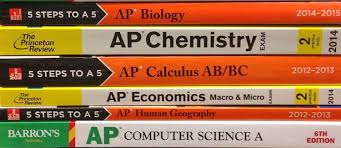Experts in higher education have long criticized the Advanced Placement (AP) program, but few have been as scathing as John Tierney, a professor at Boston College. In an article in Atlantic Magazine, he said, “Fraudulent schemes come in all shapes and sizes. To work, they typically wear a patina of respectability. That’s the case with Advanced Placement courses, one of the great frauds perpetrated on American high-school students.”
That’s a powerful statement. In this post, we’ll consider what it is about the AP program that raises the ire of Tierney and others in the media and academia.
What is the AP Program?
The AP program consists of curricula for 39 courses that may be taught in high schools in addition to regular courses. The program is administered by the College Board, the same nonprofit organization that administers the SAT exam. Colleges may allow students who have earned a qualifying score on an AP exam to skip the associated introductory course. A college may also grant these students credits toward their bachelor’s degree.
An AP course’s curriculum is developed for the College Board by a panel of high school teachers and college-level educators specializing in that academic discipline. For a high school to use the AP designation, the course must be audited by the College Board to ascertain that it satisfies the AP curriculum and other criteria.
Exams are offered in May and are administered at the schools that teach AP courses. A student may skip the course and still take the exam. This policy accommodates students who are homeschooled or attend a school that doesn’t offer the desired AP course.
The AP program was initially intended for exceptional students doing actual college-level work. Over time, it has become part of the high school experience of a large percentage of those students who aspire to attend college. Courses are offered in schools serving about 80% of all secondary students. The average high school offers eight AP classes. One-third of high school students take an AP exam in a given year. In May of their senior year, 1.2 members of the high school class of 2022 took 4 million AP exams.
Registration for an AP course and exam costs $97, which may be waived for students lacking resources. The AP program is the College Board’s largest source of revenue.
Evidence is provided by the College Board to support the efficacy of the AP program. The clearest positive argument in favor of AP participation is that high performance in AP courses correlates with higher grades and higher graduation rates in college.
Why is the AP Program Controversial?
That a huge corporation has such a massive impact on our educational system is a contentious matter in academia. Criticisms of the AP program focus on the following:
- AP courses are rarely the equivalent of relevant college courses because they cover complex subjects superficially.
- The monetary argument for the AP program — that it can enable a student to avoid up to a year of tuition by accelerating their accumulation of credits — should not be assumed. Students receiving AP credit from colleges is becoming less common. Although AP students may be allowed to opt out of the introductory class in a department, they often discover later that the AP course didn’t adequately prepare them for advanced courses in that department.
- Students should refer to a college’s website to fully understand its policy on the granting of AP credits. There are two types of institutions that students should check out carefully before making assumptions about AP credits. They are: Elite Undergraduate Institutions: Many of these schools don’t grant AP credit, and some that do grant credit only award 5’s on the exam; and Medical Schools: Applicants cannot use AP credits to fulfill science requirements for most medical schools regardless of the AP policy of their undergraduate college. This may be a problem for applicants who were unaware of this years in advance. If they learn about it after applying, they must make up the requirements by taking introductory-level courses intended for underclassmen.
- Studies show that many students who take AP courses are only marginally qualified, resulting in growing failure rates on AP exams. Unqualified students drag down AP courses for the students who are qualified.
- Students who take AP courses even though they’re underqualified are highly stressed due to their high intensity level. This can cause a reduction in the time spent on other classes, lowering the GPA’s and harming college admissions prospects.
- The AP brand name is powerful. It convinces many students who take courses and pass exams that they are top-tier college material when they may not be. This leads to demoralizing and disappointing outcomes during admission season.
- Despite rapid growth in AP enrollment, many minority students are unable to take the courses because their high schools cannot afford to offer them. As a result, these students have one more disadvantage in college admissions.
- AP courses imposes a substantial opportunity cost on non-AP students as a result of what a school must sacrifice in order to offer them. AP courses have small class sizes and the best teachers. Therefore, schools are often forced to increase the size of their non-AP classes and to transfer strong teachers out of them. The opportunity costs are more consequential in low-income school districts.
- It doesn’t make sense to force the best teachers and students into a rigid curriculum. AP courses can lead to stagnation or, as Tierney describes it, “… a kind of mindless genuflection to a prescribed plan of study that squelches creativity and free inquiry”.
- AP classes can be less worthwhile for students than classes taught under the expertise of the teacher. Pressure on teachers to produce high scores on AP exams forces them to spend much class time in test-prep mode rather than teaching. Many AP students focus on their ability to fulfill AP exam requirements rather than on learning the subject.
- The Board’s argument that AP courses correlate with better grades and higher graduation rates in college is the same as saying that those students who perform well in high school also perform well in college and are more likely to graduate.
The College Board’s Lack of Transparency
A recent controversy has exposed how the College Board’s AP program actually works. The Board has always maintained that the academic merit of AP courses rests on committees of expert educators: high school teachers and college professors specializing in the subject . But it has become clear that some academic choices are made by administrative managers who are not academically qualified. The College Board has demonstrated that it bends to politics in order to maximize revenue.
The rollout of the AP African American Studies course has shown how the Board’s approach to AP course content may disregard the value of academic qualifications. Even with all the scrutiny brought to bear on this course, the Board has not been transparent about who really makes the decisions about what students should be taught. If this is true of African American studies, it’s likely to be true of other academic disciplines. Many feel that course curricula should never be determined by the College Board, an organization with $1.4 billion in annual revenue that, although organized as a nonprofit, is sharply focused on generating revenue.
Dropping AP is Difficult for High Schools
Seven elite private schools in the Washington DC metro area dropped the AP program in 2018, stating in their announcement, “The truth is that college courses, which demand critical thinking and rigorous analysis, look nothing like AP courses, which stress breadth over depth. Moving away from AP courses will allow us to offer courses that are foundational, allow for authentic engagement with the world and demonstrate respect for students’ intellectual curiosity and interests.”
This move by prestigious prep schools failed to start a trend. It’s difficult for a high school to drop the AP program because the courses have become the de facto standard for high-achieving students. Ambitious students know that their peers will be taking multiple AP courses and that college admissions officers value AP courses over non-AP courses. Applicants without an impressive array of AP courses on their academic record are at a disadvantage when applying to a top college. This fact explains why dropping the AP program is problematic for high schools, especially in affluent areas.


Recent Comments